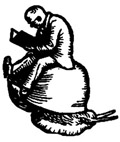Robert Lowell and I met by chance in front of an elevator at Holyoke Center. Lowell was teaching a writing seminar, and I was taking Neil Rudenstine's seminar on Sidney's poetry. Someone in Lowell's seminar introduced us to his teacher and brought us into some talk about the usefulness of sonnets that Lowell had mentioned that day in his seminar.
When we reached street level, everyone noticed that it had begun to snow. By chance Lowell and I met again an hour later stuck on the platform at the Airport subway stop on the Blie Line. While everybody was waiting for the shuttle bus, he mumbled it would be easier to walk, and walk we did. On the winter trek to the main terminals at Logan, past the green National Guard planes that were now well-covered with snow, Lowell explained to me that he wrote sonnets "as his notebook" during those heady times, and he advised young poets to do the same.
When the notebooks were published a few years later, with the blue cover, as Notebooks 1967-68, there was a sonnet about the walk, called "Blizzard in Cambridge." I always wondered if he had imagined me as the one of the "stranded New Yorkers with wild mild eyes," but I never had a chance to ask him. He died suddenly in a taxi during his Cambridge-New York commute a few years later.
In a larger compilation of the notebook sonnets, History, many of us noted that Lowell had expanded his use of the sonnet form to create an intensely compressed history of the world. In a decade that often invoked history, the notebooks of Robert Lowell's sonnets still stand as the most authentic poems from the gates of ivory and horn past which we all trekked during those years. – MS
Trade Secret
Robert Lowell's Sonnets in the Sixties
Of all the Hydramatic forms, none got better use
than sixties sonnets that drove the glory days
of good confessions locked into the chase
with Caligula's shifting time and space
Those driven blue notebooks lined up ABBA
with Lens, Chomsky, and MacDonald
arm-locked at Pentagon and Hanscom Field:
annals Lowell would never confess by day.
But, then, by night, he would have total recall
of diligent actions that left all events unfurled
and trade secrets that touched the world
in their well-made iambs of decline and fall.
History thus made, Lowell made the sonnet right;
where others brought indictments, he would indite.
|

